If you want to produce professional PHP code, you’ll need a top-notch PHP code editor that supports your preferred programming style. PHP editors are widely available, and while they may all appear similar at first sight, each has its own set of capabilities. Therefore, choosing the best PHP code editors and IDEs can get confusing. Also, many people often get confused about the difference between the two. Fret not! We are here to guide you about the differences and choose the best PHP IDEs and editors in this article.
What is the difference between PHP Code Editors and IDEs?
People who have freshly started their careers in the field of programming might get baffled about why one needs a different editor and IDE. After all, both are used for coding by programmers. However, there is a fine line between the two.
IDE (Integrated Development Environment) consists of a package that enables you to conveniently write and compile as well as execute and debug your code.
Alternatively, a code editor can be defined as a text editor that contains features that aid the process of writing code through an available plugin or its native capability.
While IDE works on a single language, code editors are capable of working with numerous programming languages. IDE also comes with a language-specific debugger and interpreter/ compiler. Code editors, however, have finite functionality meaning that they are only useful to write code. In brief, PHP IDE can be viewed as a PHP Editor with advanced features.
You’ll be better off using a PHP editor if you’re new to programming or don’t create complicated PHP apps. It is quicker to load, has a simpler user interface, and configuration and setup are effortless. Furthermore, it offers you all the editing tools that are needed. For a programmer who holds a lot of experience and develops complicated apps, PHP IDE would be the best choice.
IDEs for PHP Development
1. PhpStorm
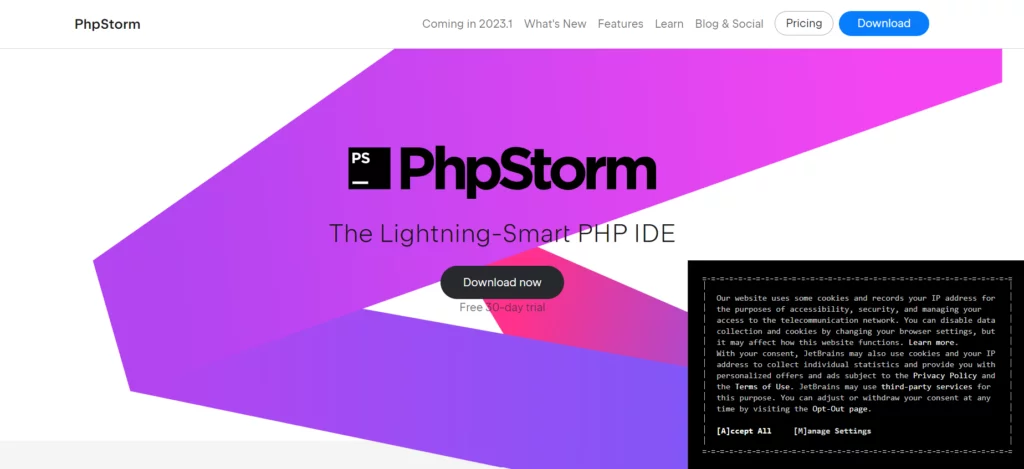
If there’s any IDE that truly understands your code, it is PhpStorm. The user interface has been substantially modernized for the year 2023. As of this moment, there are more than 600,000 active users of PhpStorm all around the world.
It supports the latest version of PHP, that is, PHP 8.2. It also provides prevention of sudden errors, autocompletion and code refactoring, extended HTML, JavaScript, and CSS editor, and zero configuration debugging. Novice developers can rely on it since it features an extremely simple user interface along with a starting time that is astonishingly fast. While most IDEs with excessive functionality take a long time to launch, PhpStorm is launched instantaneously.
The best feature of PhpStorm is that it allows for the editing of databases, the execution of queries, as well as the modification and analysis of schemas based on UML diagrams. In addition to this, it offers facilities for handling SQL queries and project databases via its code assistance facilities.
Features:
- Platforms Supported: Linux, Microsoft Windows, Mac OS X
- Languages Supported: PHP versions 5.3, 5.4, 5.5, 5.6, and 7.0, JavaScript and HTML
Pricing: USD 249 for the first year, subsequent usage costs less
2. Netbeans
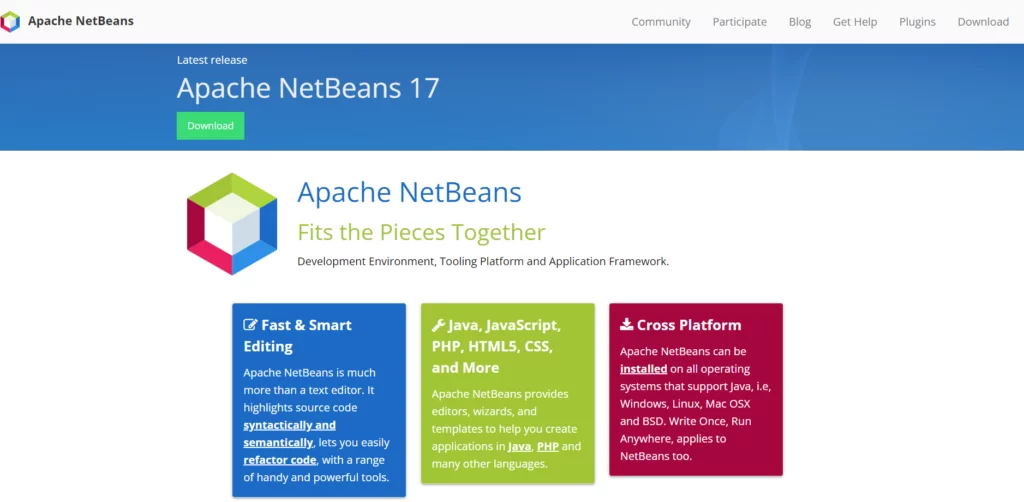
Designed specifically for Java, Netbeans is an IDE that typically works on Linux, Windows, macOS, and Solaris. It has eased the tedious process of creating mobile, online, desktop, and business apps using HTML5 and Java platforms.
Netbeans provides extensions for various programming languages. The PHP runtime of Netbeans offers a PHP IDE that has all the features and lets the developers profile PHP applications, run, debug, and refactor. In addition, it also provides the whistles and common bells of a PHP editor, like 1000+ plugins, over-customizable themes, syntax highlighting, and much more.
Features:
- Platforms Supported: Linux, Microsoft Windows, Mac OS X
- Languages Supported: JavaScript, Java ME & SE, HTML5, C/C++, PHP, XML, JSP, Groovy, and Javadoc.
Pricing: Free
3. Visual Studio Code
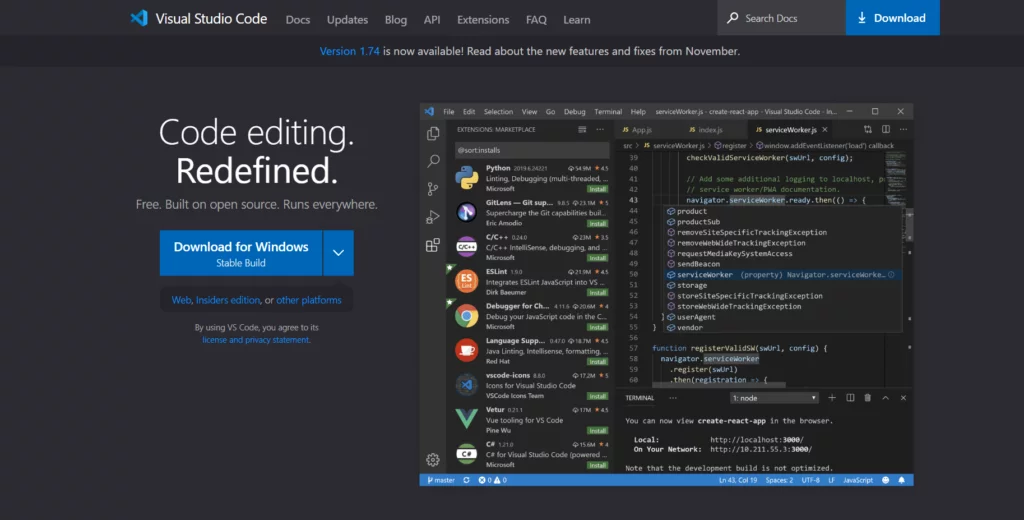
Microsoft’s open-source and free code editor Visual Studio Code has quickly become a favorite among programmers. Code editing, task management, and debugging are just some of the development processes that Visual Studio Code facilitates. VS Code’s focus is on providing the essentials for a rapid iteration of the code-build-debug cycle while leaving the complexities of other development processes to more robust IDEs.
In Visual Studio Code, IntelliSense is front and center. IntelliSense automatically suggests appropriate completions depending on the current context, including function definitions, variable types, and imported modules. Moreover, you may debug with Visual Studio Code without leaving the editor. You can run the debugger from scratch, or attach it to an already-running instance of an app to use its breakpoints, call stacks, and interactive terminal.
Features:
- Platform(s): Microsoft Windows, Linux, and Mac OS X.
- Supported Languages: Clojure, Batch, C++, CoffeeScript, DockerFile, Elixir, F#, Go, Java, Pug template language, HandleBars, Lua, Ini, Makefile, Objective-C, PowerShell, Python, Perl, R, Ruby, Razor, Rust, Visual Basic, SQL, and XML.
Price: Free
4. Komodo
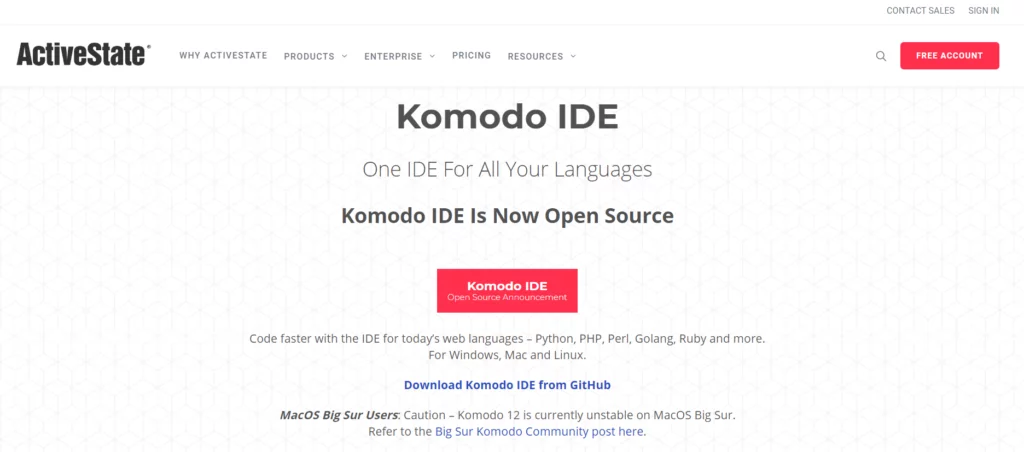
The ActiveState Platform, of which Komodo IDE is a component, is a suite of powerful tools for programmers working with free and open-source languages. It’s an IDE that works on multiple platforms and supports PHP (besides other languages). You can gain access to all the features of Komodo Edit, plus a lot more with Komodo IDE, including live previewing, unit testing, a dependency detector, and Chrome debugging, among many more.
Komodo IDE is a paid commercial product despite the fact that it may be downloaded for free. The community is so confident in its quality that you can use it for free until you’re satisfied. If you want access to email and chat assistance as well as private projects, you’ll need to subscribe to an ActiveState Pricing Plan.
Komodo Edit is a great free and open-source PHP editing program, and it’s worth considering even if you don’t need the IDE functionality but still want to edit and manage PHP files without the added baggage.
Features:
- Platforms Supported: Microsoft Windows, Mac OS X, Linux
- Languages Supported: CSS, HTML, Node.js, JavaScript, PHP, Perl, Python, Ruby, Golang, and many more.
Pricing: View the Pricing Plan here.
5. Codelite
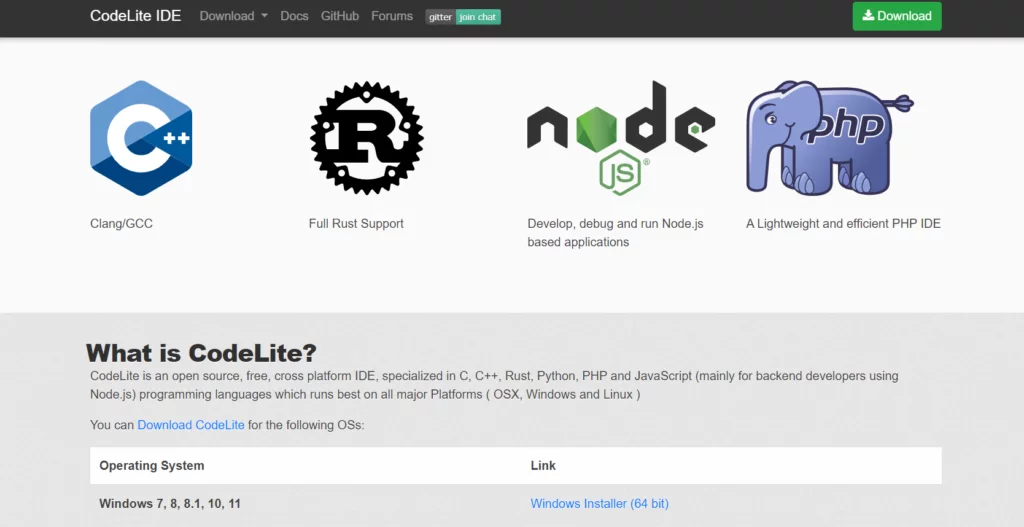
While C++ is its primary focus, PHP and Node.js are also supported in this open-source IDE known as CodeLite (as pre-installed plugins). It’s not the most sophisticated IDE out there, but it’s free and has all the essential IDE features for PHP, like project and workspace management, a built-in debugger (Xdebug), distinct views in separate panes, task management, code completion, project execution, and more.
CodeLite begins with a setup wizard that customizes the integrated development environment (IDE) to your preferences as a programmer (you can opt out if you want). You can set it up in a way that makes it work, like a PHP editor for creating websites. Point to be noted that if you don’t already have a C++ compiler on your computer, you may need to manually install one. Moreover, while CodeLite’s wiki page is adequate, it does not have as many tutorials/starter projects as the majority of the other PHP IDEs on this list.
On the other hand, if you seek an unrestricted PHP-integrated development environment (IDE) that does not depend on Java, has a large number of configurable parameters, and does not require you to form an account, then CodeLite might be the ideal choice for you.
Features:
- Platforms Supported: Microsoft Windows, Mac OS X, Linux, FreeBSD
- Languages Supported: JavaScript, HTML, PHP, C++, C, Node.js
Pricing: Basic package is $6, Standard package is $15, and Premium package is $40.
6. Zend Studio
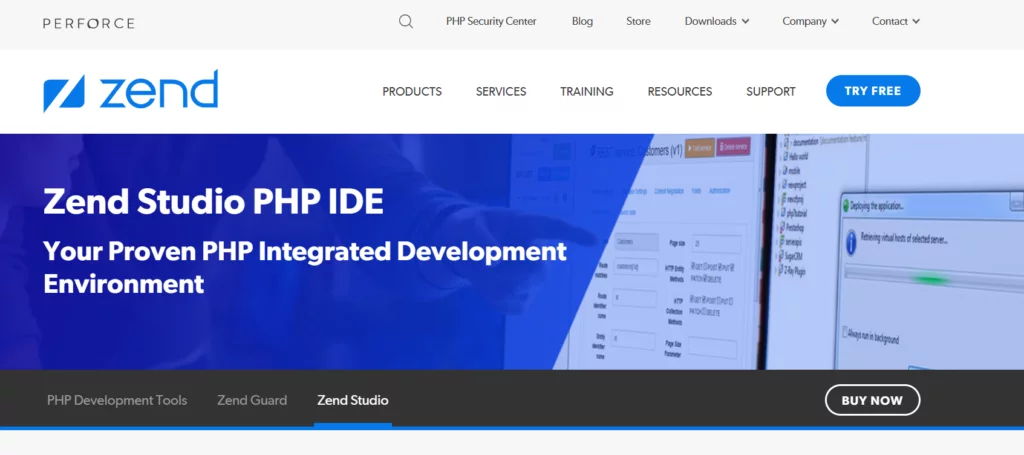
The commercial PHP IDE Zend Studio was created by the “Zend by Perforce” team, who are experts in enterprise-level PHP solutions. You can get it from the Eclipse Marketplace either on its own or as a plugin for Eclipse. Zend Studio is a paid add-on to Eclipse PHP Development Tools, which already includes a wealth of functionality suitable for use in a commercial setting.
It’s fully compatible with the rest of Zend’s offerings, including Zend Debugger, Zend Guard, Zend Server, the Laminas API Tools (previously known as Apigility), and the Laminas Framework (previously Zend Framework). Zend Studio supports many alternative debuggers, frameworks, web servers, and tools, so you are not limited to the Zend ecosystem.
Zend Studio is an extension of Eclipse PDT that adds PHP-specific features like as a more robust code assist, Microsoft SQL Server, database views for several RDBMSs (including MySQL PostgreSQL, SQLite, and Oracle), and in-built support for public and private cloud deployment.
Features:
- Platforms Supported: IBMi, Microsoft Windows, Mac OS X, Linux
- Languages Supported: CSS, HTML, Sass, Markdown, LESS, JavaScript, PHP
Pricing: $19.90/month
7. Codeanywhere
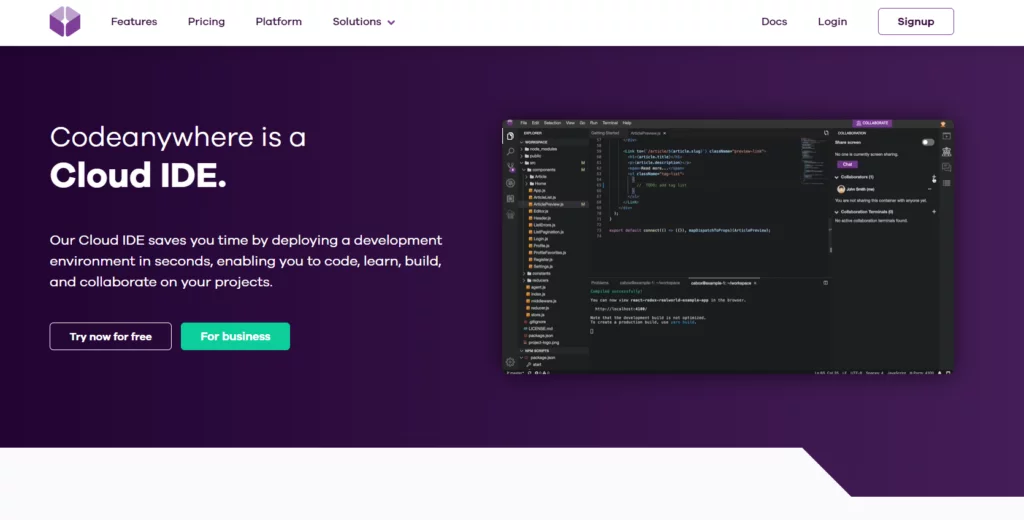
Codeanywhere is a cross-platform, cloud-based IDE that can be used from any device with a web browser. Initially titled PHPanywhere, this project has expanded to cover more than a hundred different languages. It’s built on top of CodeMirror, a free, open-source, in-browser code editor that supports multi-page documents.
Codeanywhere allows you to connect to your own server or third-party services like Bitbucket, GitHub, Google Drive, Amazon S3, DigitalOcean, and more. You can also host your development environment in an OpenVZ container (called DevBoxes). While the web-based Codeanywhere IDE can be up and running in just a few seconds, the creation of your container will take another thirty seconds to a minute.
As soon as you sign up with Codeanywhere, you’ll be greeted by a connection process that lets you select from a variety of stacks, including two LAMP stacks (Ubuntu and CentOS) that include phpMyAdmin and Composer. These PHP stacks can also be initiated with WordPress and the WordPress Command Line Interface already installed. You also have the alternative of using a bespoke stack. Codeanywhere allows you to run live HTTP and HTTPS tests on your PHP project from any web browser.
Features:
- Platforms supported: iOS, Android, any web browser
- Languages Supported: CSS, HTML, Sass, Markdown, LESS, TypeScript, JavaScript, PHP, Node.js, Python, Ruby, Go, Java, and more
Code Editors for PHP Development
1. Visual Studio Code
It’s no secret that the Microsoft program editor Visual Studio Code (VS Code) has become increasingly popular in recent years. It comes with built-in support for the PHP syntax and, with the help of extensions from the VS Code Marketplace, can be transformed into a very capable PHP editor. All of Visual Studio Code—from its appearance to its key bindings to its connectors and its functionality—can be modified to suit your needs.
Features:
- Platforms Supported: Linux, Windows, macOS
- Languages Supported: HTML, PHP, Less, CSS, JSON, SCSS, JavaScript, Markdown, TypeScript, C++, T-SQL, PowerShell, Python, Java, Go, .NET Core, C#, and more
- Enhanced syntax highlighting, autocompletion, and navigation; customizable color schemes
- In-built support for Git and GitHub and Emmet
- Extensibility facility (create customized extension)
- Live-share terminal linter/debugger/refactor for collaborative coding pairs
2. Atom
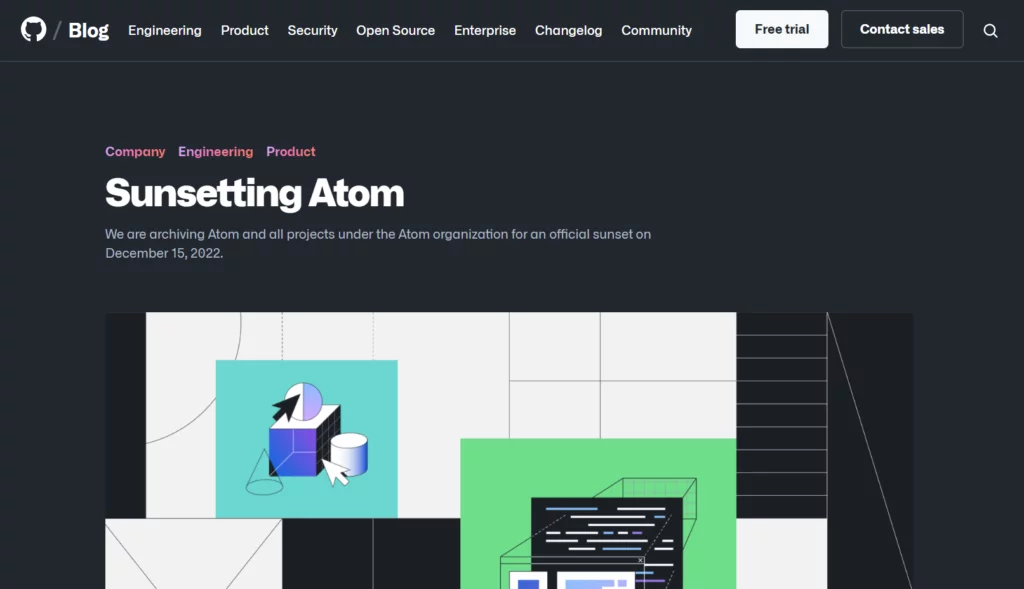
With a tagline like “the hackable text editor for the 21st century,” it’s no surprise that Atom has become popular. Though it was originally developed as an internal tool at GitHub, the project has still been actively supported by the company. The term “hackable” refers to the fact that nearly every facet of the editor’s user interface can be altered at the user’s whim, from the look and feel to the key bindings, syntax theme, formatting, and even language-specific settings.
You can extend the capabilities of the core editor by installing one of the nearly 9,000 available packages. Atom can be set up as a PHP editor by installing packages tailored to debugging, refactoring, annotations, and linting in the PHP language. The features include a highly modifiable user interface, syntax highlighting with intelligent autocomplete, file system browsing, powerful search and replace function and package manager (apm), a command menu that can be easily accessed, real-time code collaboration, and syncing between Git and GitHub.
Features:
- Platforms Supported: Microsoft Windows, Mac OS X, Linux, FreeBSD
- Languages Supported: HTML, PHP, JavaScript, CSS, C, Objective C, C#, Java, Go, Python, XML, Perl, Ruby, and more.
3. Bracket
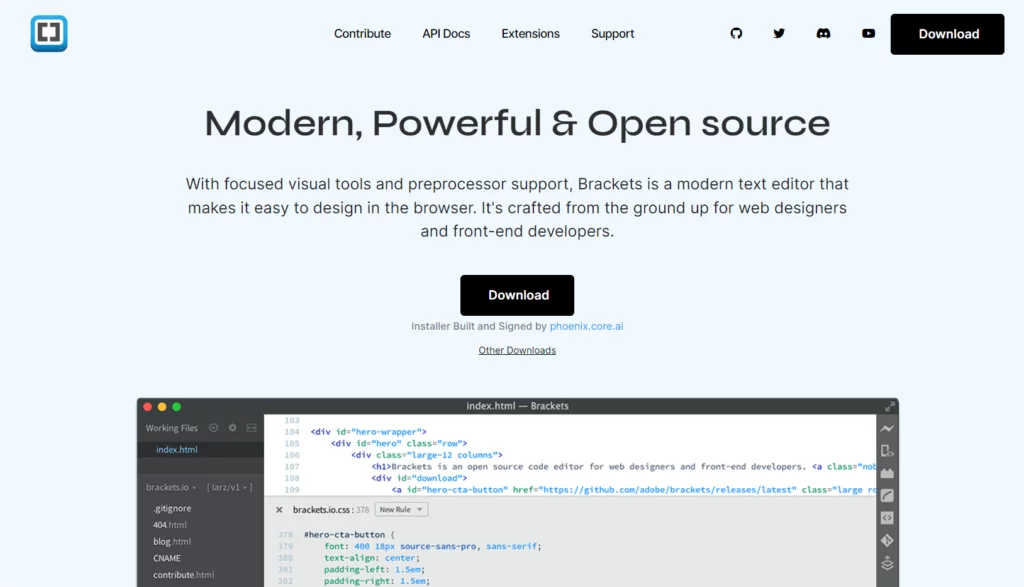
Adobe’s Brackets is a free, open-source coding editor. Although it, like many other Adobe products, is often geared toward front-end work, it does offer support for other back-end languages, including PHP. One of the reasons for the accomplishment of this editor is the ability to view all selectors associated with a given CSS rule while modifying the rule inline.
Most developers handle both the front and back ends of a project using CSS preprocessors like Sass and LESS, which means that Brackets could be the ideal PHP editor for you. Brackets may not have the most advanced features of the PHP editors listed here, but it is the most user-friendly, lightweight, and straightforward. The Brackets extension registry works similarly to that of Atom and Visual Studio Code.
Features:
- Platforms Supported: Linux, Windows, macOS
- Languages Supported: CSS, HTML, SCSS, LESS, JavaScript, Sass, PHP, Python, Java, Ruby, Perl, VBScript, C++, C, and more.
4. Vim
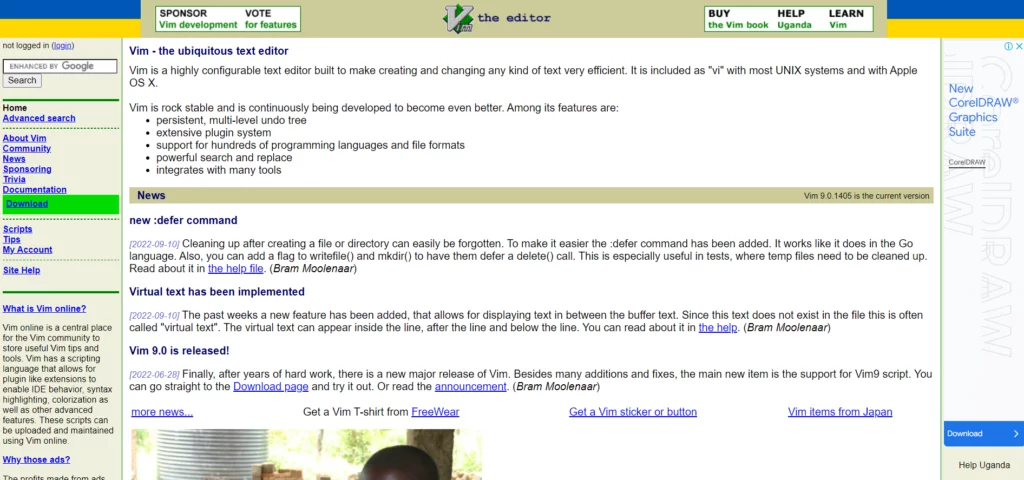
The name “Vim” refers to the fact that it is an enhanced variant of the original “Vi,” a code editor developed for Unix-based systems. A number of useful enhancements to Vi are included, including the ability to compare and merge files, search history, syntax highlighting, spell checking, and support for protocols including HTTP, FTP, SSH, and split view.
This article by FreeCodeCamp summarizes the primary distinctions between the six primary Vim modes (normal, visual, insert, select, command line, and ex (exit)). Vim is a text editor with a command line interface and a set of keyboard shortcuts for common tasks. In contrast, Gvim (Graphical Vim) is also available for download if you’d prefer a graphical user interface.
Vim, like Emacs, is extremely flexible and can be extended to handle a wide variety of programming languages. There are dozens of third-party plugins for Vim, but you may also extend its capabilities by writing your own scripts in Vim Script (commonly known as VimL) or another scripting language.
While Vim is a powerful tool, it may not be the greatest option for beginners or infrequent coders due to its high learning curve. Vim, on the other hand, can be the appropriate PHP editor for you if you desire custom functionality and flexibility.
Features:
- Platforms Supported: macOS, iOS, Android, Linux, Windows
- Languages Supported: Python, PHP, Java, JavaScript, Ruby, Lua, Perl, C++, C, and many others.
5. Notepad++
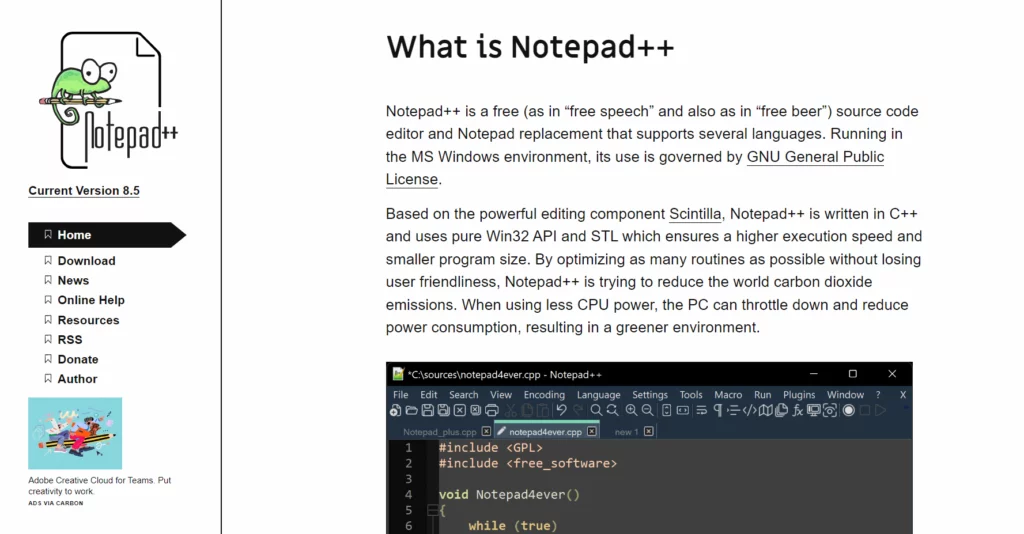
Notepad++ is a tried-and-true text editor for writing code on Windows computers. It was designed to take the place of Notepad, the basic text editor that comes standard on Windows computers. Notepad++ is a popular choice among Windows-based developers since it expands upon the functionality of the standard Notepad editor.
It supports syntax highlighting for around 80 different programming languages out of the box. It’s straightforward to set up and use right away, and it comes loaded with useful editing features like a split screen, a multi-document interface, and undo/redo. Notepad++ is a free, lightweight, and user-friendly PHP editor for Windows.
Features:
- Platforms Supported: Windows
- Languages Supported: CSS, HTML, YAML, XML, CoffeeScript, JavaScript, SQL, PHP, Python, Perl, C++, C, and more
6. Sublime Text 3
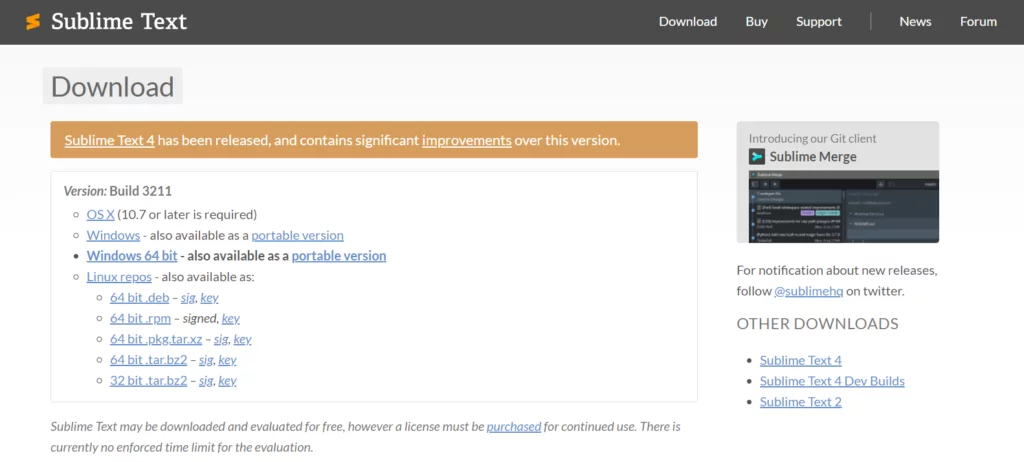
The third major version of the popular code editor Sublime Text is version 3. Aside from fixing speed issues like a long startup time, the newest edition of this popular editor also includes new functionality like pain management and a symbol index. Sublime Text 3’s plugin system allows for extensive customization; in addition to the many premade plugins accessible through the editor’s package management, you may also write your own.
Sublime Text 3 is a popular choice as a PHP editor since it supports a wide variety of plugins for the language, including those for linting, comment generation, beautifying, testing, formatting, and more. In addition, it comes with a number of useful plugins for WordPress developers.
Features:
- Platforms Supported: Linux, Windows, macOS
- Languages Supported: CSS, HTML, LESS, Sass, JavaScript, Markdown, Python, PHP, Java, Ruby, Perl, and more.
7. UltraEdit
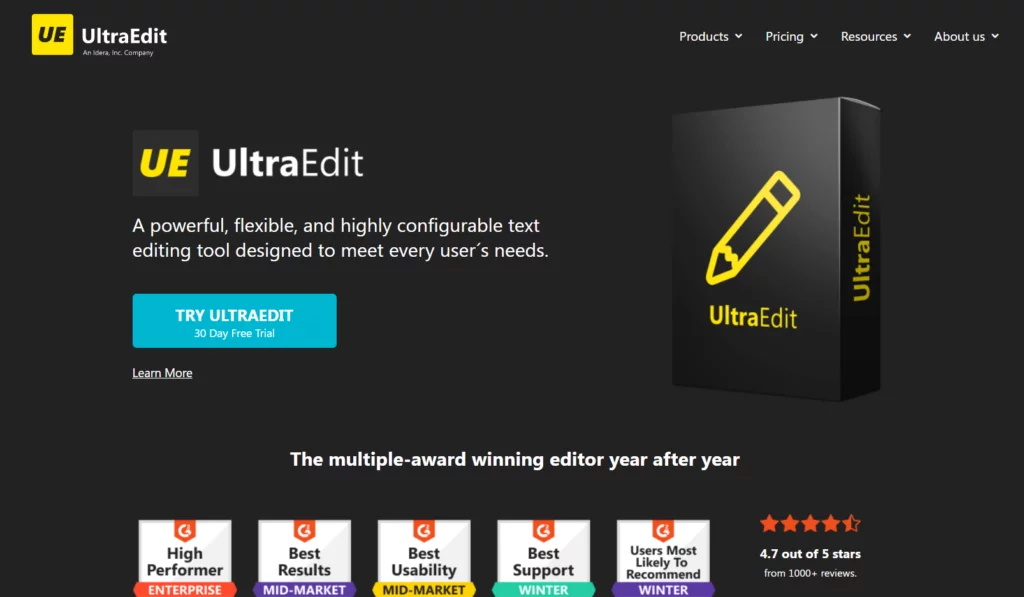
Since its release in 1994, UltraEdit has been widely used as a premier source code editor. With over 4 million customers, this software has shown to be reliable and popular. UltraEdit is ready to use upon installation, and its setup process is simple and straightforward. Powerful developer tools, such as cloud/remote server support, file backup/management, project tracking, encryption/decryption, and more, are included, along with a user-friendly interface you may tweak to your own.
UltraEdit is so well-liked among programmers because it can handle extremely large files, making it the ideal PHP editor for those who work with such files. Together with UltraEdit, the license grants access to UltraCompare Pro, a robust file comparison tool that works with all of the most popular version control systems (Git, Subversion, and CVS, among others).
Features:
- Platform Supported: macOS, Windows, Linux
- Languages Supported: CSS, HTML, XML, Markdown, JSON, MySQL, JavaScript, PHP, Perl, Python, Ruby, C++, C, and more.
Conclusion
The distinction between an integrated development environment (IDE) and a code editor is often less, which can lead to significant confusion. We hope this article has cleared all your queries, so you can make an informed decision. In case you have more queries on it, feel free to post your queries in the comments section below.



